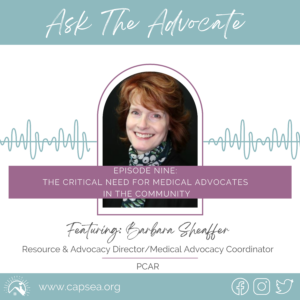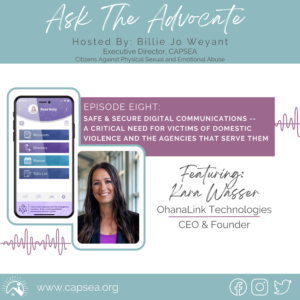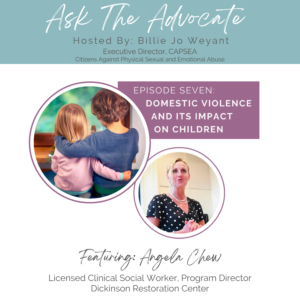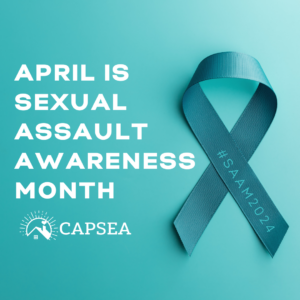Ask the Advocate Podcast: Episode 5
Fighting Human Trafficking
Featuring: Jamie Beck, President and Managing Attorney of Free to Thrive
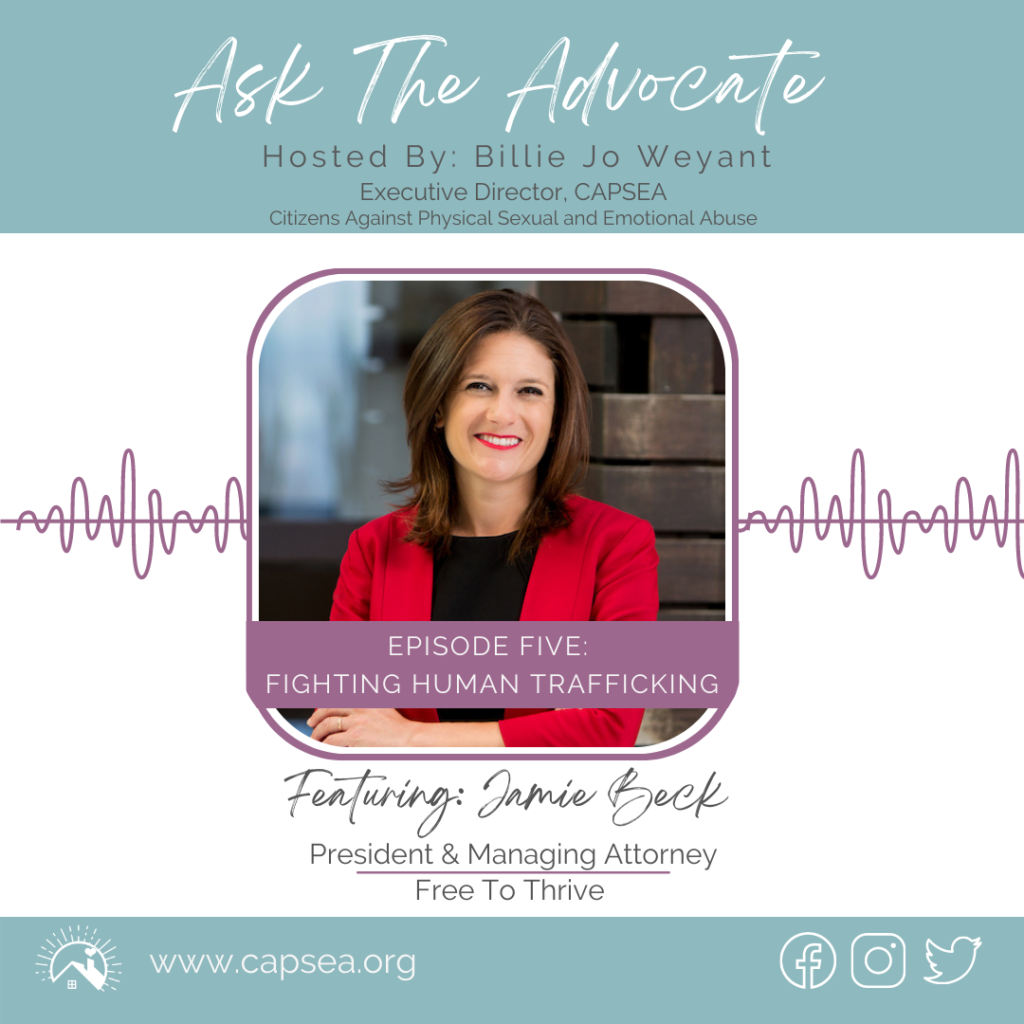
about the Episode
"The reality is that right now, with human trafficking, we are where domestic violence was back in the 80's... We didn't actually have a crime that we called human trafficking until the early 2000's."
– What is human or labor trafficking?
– How common is this issue?
– Where do you most often see this take place?
– Who is the ‘typical’ victim?
Legal advocate for victims of human trafficking, Jamie Beck, tackles these topics and more in this episode of Ask The Advocate. Jamie also shares what the nonprofit Free To Thrive is doing to support victims of human trafficking, and to help end this surprisingly prevalent issue. Learn more at freetothrive.org.
Billie Jo Weyant: (00:00)
You’re listening to Ask the Advocate, a podcast series that features advocates for domestic violence, sexual violence, and all other survivors of abuse and serious crime. I’m your host, Billie Jo Weyant. And for the past three decades, I’ve worked in the victim services industry serving as the executive director for a Pennsylvania based nonprofit named CAPSEA, which stands for citizens against physical sexual and emotional abuse. I invite you to join me as I sit down with my guests, each episode, to discuss critical victim service resources and to help raise awareness for the most pressing challenges facing survivors and the nonprofit agencies that serve them.
Billie Jo Weyant: (00:44)
Hello, and welcome to episode five of Ask the Advocate. I’m Billie Jo Weyant your host, with over 30 years in victim services. And I am so honored today to have my guest here. Her name is Jamie Beck. She is the President in Managing Attorney of Free to Thrive. It’s a nonprofit that empowers survivors of human trafficking to be free from exploitation and to thrive by providing them with legal services and connections to other supportive services. Widely recognized and awarded for her tireless efforts to bring justice and healing to survivors, Jamie provides training and hands-on opportunities for law students and lawyers abound to serve trafficked persons in a trauma-informed manner. I am so excited to have you here today Jamie! Their website is freetothrive.org, we’re gonna mention that again, but today I’m so excited because all the years that I’ve worked in victim services, Jamie, and again, welcome for being here. I am- So we are, we are so uneducated about human trafficking and coming from where I come from, a lot of folks don’t believe it even happens around here. And so I am really excited to have you with me, and I’m gonna turn this over to you because I want to know: What is human trafficking? Who are the victims? How can we help? I have so many things. So without further ado, you go right ahead. Thank you.
Jamie Beck: (02:15)
Well, thank you so much for having me, Billie Jo, and, and for highlighting this topic. And you know, what you said is so important that, you know, so often people don’t know what human trafficking is and it’s happening around us. And you know, there’s one, one thing I wanna share with you: So you’ve been in this space for a very long time. The reality is, is that we right now with human trafficking are where domestic violence was back in like the eighties, maybe. You know, our human trafficking laws in the United States… they weren’t created until the early 2000s. So we didn’t actually have a crime that we called human trafficking, which means we didn’t have somebody we labeled as a victim until the early 2000s. And it’s taken us this long just to start to understand this, start, to identify where this is happening and how it happens. Um, so we’re, we’re really behind. And so it’s totally understandable that so many people in our community don’t even know what it is. And so I’m happy to shed some light on that today.
Billie Jo Weyant: (03:10)
Wonderful, great.
Jamie Beck: (03:13)
Well, let me just start with, what is human trafficking, that this kind of threshold question is? What are we talking about?
Billie Jo Weyant: (03:18)
Sure.
Jamie Beck: (03:18)
Um, there’s a lot of misinformation out there about what it is and confusion. Um, human trafficking is exploiting another person for purposes of sex or labor by means of force, fraud, or coercion. It also is a commercial sex act involving a minor, because a minor cannot consent to engage in commercial sex. Now human trafficking is often confused with, uh, smuggling, human smuggling: Bringing somebody illegally across the border or kidnapping them and taking them across state lines. Those are totally different crimes. Um, human trafficking actually doesn’t require moving somebody anywhere. Somebody could be trafficked in a single city and never leave that city. It’s trafficking if they’re exploited for sex or, or, um, it’s ex by means a forced fraud or coercion, or they’re exploiting a child for sex.
Billie Jo Weyant: (04:08)
And, you know, nobody would even think that because again, we through, I think even media, there has been that picture painted just like victims of domestic violence, sexual violence that we see every day, there’s a picture painted and people just kind of imprint that in their brain. And then that’s all the more that they kind of wanna know about it. Can you tell me, again, where I come from total of about 35,000 people in the entire service area, that’s a two county area in Pennsylvania. So in this small little area, how prevalent would it be? I know you’re from California, San Diego. Am I correct?
Jamie Beck: (04:50)
Yep.
Billie Jo Weyant: (04:51)
So, I mean, you’re looking at it in a different way than we would here. So can you help me out here? How prevalent could it be in little old Elk or Cameron counties or in smaller communities?
Jamie Beck: (05:06)
You know, it, it’s one of those things like human trafficking is everywhere, but it’s gonna look really different depending on where you are. So you’re absolutely right. It’s gonna look really different in San Diego where some of the, you know, big cities in our country compared to a rural area, um, or even a suburban area, it’s gonna look really different. So, um, we have to look separately at sex trafficking and labor trafficking, because they’re gonna be totally different.
Billie Jo Weyant: (05:28)
Um, okay.
Jamie Beck: (05:29)
When we think about labor trafficking, any community, that’s got an agricultural, um, you know, economy… There’s probably labor trafficking happening because unfortunately in our agricultural industry, a lot of labor are exploited for their, for their labor. And you know, it’s, it’s different than a wage and hour violation of somebody, “Oh, I’m not getting paid minimum wage. I’m not, you know, I’m working overtime and nobody’s paying me.” That labor exploitation is somebody who is- There’s force fraud or coercion, meaning they are being forced to work.
Jamie Beck: (06:01)
They don’t have a choice. So, you know, if some people will be forced to work through, um, like indebted servitude of, if somebody, you know, this is where, how labor trafficking, um, and, um, human smuggling get conflated. If somebody is brought here illegally and they are some, the person who brought them, there are people related to those people are saying, “You owe me money. I got you here. And now you owe me, you know, $10,000 and you have to pay for your, where you live. You have to pay for your food.” And essentially what happens is they work and never get paid and they’re owed, they say, they’re owed this money. And the number just keeps going up, not down, they’re never paying off that debt. Um, that’s, that’s one way it happens. If somebody is working and not getting paid or getting paid way, way, way below the minimum wage.
Jamie Beck: (06:51)
And the key is like, oftentimes there’s no, they don’t have the ability to leave that job. You know, if you’re not getting paid, your boss isn’t paying you. You can walk out the door and go get another job. If somebody’s in a situation where they live where they’re working, they don’t have the ability to get another job. There’s oftentimes, you know, somebody’s holding something over their head. That’s where we start to get into exploitation. So rural, um, you know, kind of agriculture, but it could be nail salons. It could be restaurant workers. It could be, um, people working in massage businesses. It’s, you know, there’s all types of businesses. We’ve had bakeries trafficking people. I mean, literally it could be any kind of business where the laborers are being exploited, the people working there, um, people that work in other people’s homes, domestic workers, um, construction workers.
Jamie Beck: (07:38)
So it’s, it’s across industries. And then when it comes to sex trafficking in, in rural communities, what is more common is truck stops. There, unfortunately, there is a huge industry of trafficking on our country’s truck routes. Um, you have truck drivers who are working by themselves, working very long hours and have created an economy for buying sex, then other people who wanna buy sex know truck stops is where you go to buy sex. So people who may not be truck drivers are stopping at truck stops, um, to buy sex. And one really, really positive thing of this really disturbing fact is there’s an organization called Truckers Against Trafficking that started because they saw this was such a huge issue on our truck routes, that they started this awareness campaign and now truckers have really come together to fight human trafficking. Um, there’s also Churches Against Trafficking. So there’s different groups that have come together to fight these issues, but it’s just, you know, without knowing as much about your community, I can’t tell you exactly what it looks like, but I can tell you it’s definitely happening. Um, and it’s gonna look very different.
Billie Jo Weyant: (08:43)
And, and, you know, you just educated me on the fact that, where we are, we’re very rural, but we have major state and interstate, uh, highways that are very, very close by. So Interstate 80, I mean, Interstate 80’s, probably at the most 40 miles away from here, maybe even less from where I’m at. So, and Route 219, which is a major state thoroughfare, runs right through where CAPSEA is. So, so that just educated me. I, it kind of I’m, you know, a bell went off because of all that. Um, can you tell me a little bit about, uh, Jamie, what are like the majority of circumstances that you experience at Free to Thrive when it comes to the trafficking?
Jamie Beck: (09:36)
In terms of like how somebody becomes trafficked?
Billie Jo Weyant: (09:39)
Yes, is there, is there something like, are you seeing a higher percentage of something in particular than other things?
Jamie Beck: (09:50)
So, one thing I always like to share is that there is no one story, right? Trafficking is gonna look, look very, very different for every single person, but there are some common threads that run through many of our stories. Um, so very often, almost always, if not in every single case I’ve ever had, there’s always a vulnerability that puts somebody on the path to exploitation.
Billie Jo Weyant: (10:14)
Okay.
Jamie Beck: (10:14)
Sometimes the vulnerability is being a foster youth, or runaway, or an LGBTQ kid who may have been kicked out of their home when they came out to their family. Um, and they don’t have any family support system. They may be, um, you know, somebody who’s experiencing poverty, somebody who is, um, experiencing addiction or comes from a family where there, where there’s abuse in the home or neglect, whatever it is that person has some sort of vulnerability that traffickers seize upon.
Jamie Beck: (10:47)
It’s like, they know they find these vulnerable individuals and they see that vulnerability and they exploit it. So if somebody is looking for love and belonging, they find that they say, I love you. You know, I will take care of you. You know, nobody loves you. Like I do. Nobody understands you like I do. And they actually use love as a tool of coercion. They also use drugs as a tool of co coercion. They either, you know, have many clients who had never touched drugs before they were trafficked and traffickers use those drugs to control them, to get at them addicted. And then they use the drugs to numb their pain. Once they’re in this state that they can’t get out of. Some people may have experienced addiction prior to, um, being exploited. And the trafficking is a way to feed their drug habit. So it might be that a trafficker identifies somebody who’s already addicted to drugs and says, I know how you can get some more drugs.
Jamie Beck: (11:38)
I will take care of you. And they continue to feed that drug habit because they know they will continue to be able to exploit that person. Um, but it’s sometimes the vulnerability is being a 16 year old kid who falls in love with the wrong person, um, or meets the wrong person. You know, I’ve heard of kids getting picked up at shopping malls, at movie theaters. I mean, there’s no, literally these people are everywhere all the time. And they will find that one person who looks a little bit lonely or a little bit sad, they’ll find them on social media. Um, unfortunately the internet is the scariest place for our children these days. And it’s something that, you know, if you’re in a rural community where your kids are literally at home, they’re not even near anybody else, especially unfortunately, in, during this pandemic, guess what? You could have a trafficker in your child’s bedroom and never know it because on that little device that they have, their phone, their tablet, their computer traffickers will find them. And I have many, many clients who are first trafficked or identified by a trafficker, recruited as we call it, um, using the internet, social media, video games, anywhere that you can have contact with other people, traffickers will go and find you.
Billie Jo Weyant: (12:47)
And I think right there, what you just said about the video games on a computer, on a cell phone, anything social media. I think that is just what we all need to hear because who would’ve ever thought that, I mean, you just don’t think that way, because we’ve never had to experience that ourselves when we were younger. And I mean, you’re really opening my eyes and I hope anybody that listens or views this opens their eyes and, you know, makes them more aware and want to do something to help people or potentially help if someone comes and they’re in need. I know I’m already thinking of things that we can do at our organization better and to help folks, because, and I’ve said this before to many people, the fact that I know we’ve had trafficked individuals call us on the phone, stay in our shelter, receive counseling services. I know we just don’t kn- We still are learning how to see that and provide that trauma-informed, um, help for that person. And what’s the appropriate way to ask or engage that conversation? Do you have any pointers off the top of your head that, you know, I could tell our staff or people listening to, to this podcast would be able to recognize and possibly point someone in the right direction?
Jamie Beck: (14:23)
Yeah. Well, I’ll give you a couple tips. I would definitely encourage anybody working in with, you know, any vulnerable population to get training on human trafficking, the signs to look for and what to do to identify someone and you’re right. I guarantee you’ve served trafficking victims. Um, just a coup- a data point among our clients is that 88% of our clients are also victims of domestic violence. Um, the vast majority of them have been identified by law enforcement or served by service providers as a victim of DV. And they don’t, they don’t even know they’re a trafficking victim. Trafficking victims, don’t know, you know, the same way that most people don’t know what human trafficking is, those who are being exploited don’t know what it is. So they’re not gonna say, “I’m a victim of human trafficking. Help me.” They’re gonna say, “Sure, my boyfriend beat me up.”
Jamie Beck: (15:05)
Right. That’s what they’re gonna say. Um, or when the cops get called, it’s gonna look like a DV situation and it is a DV situation. It just happens to be that that person not only is abusing them. They’re also exploiting them. Um, but they’re not gonna say that to the cops because that could get them killed. Um, so, so yes, you have been serving them and the things, you know, things to look for. One very blatant thing that to me is always a red flag is branding tattoos. Unfortunately, and talking about sex trafficking, this doesn’t happen necessarily in labor trafficking, is traffickers will brand their names, their gang symbols, or some sort of like trafficking terms, um, on their victims. And it’s, it’s different than a tattoo of, you know, my boyfriend’s name with a heart, you know, it’s, these are intended to brand them.
Jamie Beck: (15:52)
So they’ll be in a very prominent place on their face, on their chest, on their breast. Somewhere where other people will see them and traffickers do this because they wanna say, “I own this person. She belongs to me. And I want everybody who sees her to know that she belongs to me. So I’m gonna put my name on her face.” I mean, that’s, you know, you see somebody with a face, face tattoo and you have to wonder, you know, what, why does, why would somebody tattoo somebody’s name on their face? And the answer is they probably didn’t choose to do that. Um, other things to look for, um, certainly some of the vulnerabilities that you see may be a signal that somebody has been on that path. They’ve been, you know, a former foster youth and homeless out on the streets. They’ve had, you know, they might use certain terms, you know, very often our clients refer to their traffickers as their boyfriend.
Jamie Beck: (16:41)
Um, because that’s what they think they are: A boyfriend who has lots of other girlfriends. Um, kind of a sign, uh, that could, you know, living in who do you live with? Where do you live? You know, our clients are trafficked all around and so they don’t stay in one place very long. Somebody who’s been living in hotels and moving around a large geographic area is probably being trafficked. Somebody who hasn’t had a stable life, it doesn’t mean like, “Okay, I’ve moved around a lot.” That doesn’t mean you’re a victim of human trafficking, but it’s a sign that you may wanna look a little more, somebody with an extensive criminal history. Unfortunately, our clients, over 80% of our clients have a criminal history and that criminal history is related to their exploitation. Certainly if somebody has a history of prostitution, um, that’s gonna be a signal that they may have been trafficked.
Jamie Beck: (17:25)
It doesn’t necessarily mean, but most of even people who are adults engaged in prostitution, the vast majority of them were first engaged in prostitution as a minor. And again, like we talked about, that’s human trafficking, a child, we have to understand that a child, there’s no such thing as a child prostitute. A child cannot consent to be sold for sex, right? And so if a child is engaged in commercial sex, they are by law, a victim of human trafficking. They may not know it. They may say, I wanna do this. I’m making money, but who are they giving that money to? It’s always going to someone else. They’re never keeping the money. Um, and even adults engage in prostitution who believe that they’re choosing to do that. The vast majority of those in that life are either highly vulnerable and have a history of trafficking, a history of exploitation, or they are being exploited at that time. Somebody else is taking their money. Somebody is using force, fraud, or coercion to get them to sell their bodies.
Billie Jo Weyant: (18:25)
This is so interesting because then my mind jumps right to the awareness piece. And then now, can you share with us what programs and services do you have within Free to Thrive that support that individual and their journey as a survivor?
Jamie Beck: (18:49)
So survivors of human trafficking as with, you know, many different types of victims have a whole host of needs. Now Free to Thrive. I started Free to Thrive to address specifically the legal needs of human trafficking survivors. So, you know, there’s programs that provide housing and therapy and, um, you know, case management. Free to Thrive, we provide legal services. So our clients have, like I said, they have criminal records from being trafficked. Um, they oftentimes, unfortunately are married to, or have children with their traffickers, which means in order to completely separate from that person, it’s not just walking away or leaving or escaping. It’s escaping, and then getting custody of your children, legally, divorcing that person, getting a restraining order to keep yourself and your family safe. Um, and so we do that. Those are like the main things we do.
Jamie Beck: (19:38)
We also help, um, help in criminal cases involving survivors. So we work really closely with, uh, their defense attorneys, usually public defenders and, and help as experts in those cases, helping, helping the public defender, educate the legal system about human trafficking. Because too often the same way that the general society doesn’t know, judges don’t know, prosecutors don’t know.
Billie Jo Weyant: (20:01)
Right.
Jamie Beck: (20:01)
The system looks at our client population as criminals, and we have to completely reform our legal system to understand that they’re not criminals, they’re victims. And you know, one thing we always talk about is the legal system is designed… The criminal legal system is designed to find out if a crime occurred and if so, who did it. It is not designed to ask why somebody did it. And so often our clients are involved in a crime that their trafficker forced them to commit. Um, you know, very often while being sex trafficked, traffickers also force their victims to commit other crimes or pin their crimes on them. And nobody ever asks, “Why, why did you do this? You know, what was going on in your life?” And if you would just ask why you would find out that they had a whole history of trauma that led them on the path and that their trafficker was very much involved in whatever crime they were charged with, but they’re not gonna say any of that. And so we help the criminal justice system see that, um, victimization.
Billie Jo Weyant: (21:06)
And as you were, are saying that I’m thinking all the years that I have worked with victims and thinking about, I mean, even way back when I’ve had many survivors come to CAPSEA and they also have criminal records, they, they have had to write bad checks in- back in the day just to get diapers and baby formula and food because money was withheld or spent on other things. I mean, I could, I could write a book on this and thinking, I mean, all this time up to the present and the individuals we’re working with now, you know, so many similar things and also as you were describing all of that, all I could think of was victims and offenders of domestic violence, sexual violence, and that power and control. That total power and control and that coercion and all of the above .
Jamie Beck: (22:05)
It’s all connected.
Billie Jo Weyant: (22:06)
Oh gosh yeah.
Jamie Beck: (22:06)
It’s all intertwined. It’s all connected. And I’m so glad you mentioned that because one thing that, you know, one thing that I’m really excited about, um, in this space right now is as we’ve been fighting for human trafficking survivors to be treated as victims in our criminal system, we’ve also been fighting for victims of sexual assault and domestic violence. It’s all intertwined, right? Our clients are all of the above, right?
Billie Jo Weyant: (22:26)
Yes, they are. They are.
Jamie Beck: (22:27)
And so we actually just passed a law in California that expands some of these laws that we’re talking about that help trafficking survivors, you know, clear their record, get a fresh start. We’ve actually expanded those laws, this like January 1 at 2022, that those laws actually now there’s an Affirmative Defense and a Vacatur law, which helps survivors clear their records is now expanded to victims of domestic violence and sexual assault for e xactly the reasons that you’re describing.
Billie Jo Weyant: (22:50)
That’s fabulous. Fantastic. Because I can tell you right now in the Commonwealth of Pennsylvania, I’m just telling, truth be told, I have had so many people that are hindered to move forward and they’re stuck because of legal issues and not being able to get records expunged from years ago when they were 18 years old and different things that occurred because of that cycle of violence and being a childhood victim going into adulthood. I mean, it, it’s just followed them and people change and people need to have that opportunity. So I’m so excited. I think you, we need to have you back to talk more about that. Um, also, uh, you know, I’m really interested in the fact that people who are listening or watching this, if you have- say there’s loved ones and they know that something’s going on or they’re suspecting, is there any advice or any options for, uh, loved ones, friends and family, what can they do?
Jamie Beck: (23:59)
Uh, so, I have two answers in my head because one answer is, and, and they’re both, they’re both correct. There’s not, there’s, you know, it’s super complex because you know, one answer is, you know, reach out to those in this space, understand, you know what this is how, to talk about it. Um, I think really the most important thing is, um, taking away this stigma because people that are in this life of being exploited have been told, there’s some, you know, now nobody will love you because you’ve done this, right? Your family will disown you because this has happened to you. And they, they believe that they are damaged goods at this point. And so destigmatizing what’s happening, um, you know, wrapping them around with support, giving them the mental health support that they need. But at the same time, the other answer in my head is there’s this whole language that some people and organizations will use about rescuing victims.
Jamie Beck: (24:58)
“We rescue victims of human trafficking.” There’s no such thing as rescuing somebody from human trafficking the same way you can’t rescue someone from domestic violence.
Billie Jo Weyant: (25:07)
Yeah.
Jamie Beck: (25:07)
It’s the same power and control is there. Right? Exactly what you’re saying. Billie Jo. And the reality is is that the only way somebody can get out is to escape or to leave. And that is the hardest, you know, moment for a victim of trafficking or domestic violence, is to make that conscious decision that “I won’t, I won’t stand for this anymore. I need to get out.” And sometimes it’s extremely dangerous. Sometimes they try many, many times, you know, we say, you know, DV victims have to leave seven times. We say the same thing about HT victims. Same thing because they, you know, and I hear my client’s stories. They left, they left once they left a second time or they asked for help and there, there really wasn’t any help out there for them.
Jamie Beck: (25:50)
And the reality is unless society can offer them something better than what they have. You know, this person is at the end of the day, they are exploiting them. But they’re where they live. Even if they’re living between hotels, they have a bed to sleep in. Even if they’re not sleeping a lot in their mind, they’re like, “Where am I gonna sleep?” They can’t get a job because they’re record. They have no source of income, no food, no family, no stability. Even those who came from a solid family background have been isolated from their families because- it’s exactly the same as DV. You isolate somebody so that you can control them so that they don’t have a support system. You destabilize them by moving them around to places they’re off often in a place that they have no connection to anybody.
Billie Jo Weyant: (26:31)
Yeah.
Jamie Beck: (26:32)
And until they have something better until they have, you can offer them a home and community and support and love… Until you can offer them love, they will continue to go back to that exploiter or leave that exploiter and go to somebody else. So there’s a lot that we can do, but there’s a lot of things that we can’t do that it just, and it’s something that just reminds me how incredibly strong and resilient survivors are because they did make that choice with all the barriers that they have, they said done. And they walked away and were able to leave and get out of that life. And that shows so much strength and so much courage, and it’s something that only they could do. Nobody could do that for them.
Billie Jo Weyant: (27:13)
And just so I understand correctly, I’m just gonna swing back a second. You mainly deal with the legal end of things and that type of support, and with survivors. Then you’re referring out to other partners who are also providing like the housing and different things like that, and working with those other entities. Uh, and I can tell you since CAPSEA’s a comprehensive program, and so there’s a lot under one roof that we can provide for people, but also people who are listening and viewing this, being trauma-informed like we both are, and our organizations are, we can offer people so much, but until they’re ready, ready, and they know that they can trust and support us, it’s not going to work. And gaining someone’s trust is the utmost. And once you have that trust and that confidentiality don’t ever backslide on that. You must be true to what you’re, when you’re helping someone, whether it be a victim of abuse, trafficking, all of the above.
Billie Jo Weyant: (28:19)
And I think that it’s so paramount for people to be patient and understand, because I can’t tell you how many people here that we provide housing for. We pay their rent, we do everything. And unless you have good support, ongoing support, and you don’t let out there to fend for themselves, people are gonna roll right back into that routine. And one other thing, and I don’t wanna be taking up your time, but I think it’s important for everybody to do this step back for a second, take a deep breath and think about this. And I tell our staff this or anybody I’ve ever trained when I’m working with new staff and things like that. Think about if tomorrow, somebody told you to leave your home or leave what you’re accustomed, to move into a communal setting and then be out on your own. How successful would you be? Somebody telling you, you have to do A, B, C, and D. It’s not gonna work. You’re gonna wanna go back to what feels comfortable. It doesn’t matter if it’s good, bad, and different, whatever. It’s what you’re used to because you feel some sense of security.
Jamie Beck: (29:33)
It’s so true. And I’m so glad you said that. Um, because when you put in that perspective, it helps people understand why it’s so hard, leave that situation. Um, and there’s so there’s that, you know, kind of leaving comfort or familiarity. And then on top of that, all of the psychological manipulation that that person has been subject to for so long, they’ve been so devalued. And so, um, you know, minimalized, they, they don’t know their worth. They don’t know that they can do it. And you know, that has to be built back up too.
Billie Jo Weyant: (30:08)
I, I also wanna add and I, I I’m sure that you’ve experienced this, the talent that our survivors have to channel that in a positive way. Oh my gosh. Between artistic, musical, um, just the, the know-how, the intelligence. They just don’t… They, they have no self-esteem so that’s a big, you have to build that self-esteem up with people first and work with them, and it doesn’t happen overnight. So I’m really excited to be able to, you know, learn more and do more what I can, it’s going to help us all the way around with how we provide trauma -informed services here at CAPSEA. I think it’s fantastic. You have such a stellar stellar organization. Um, I know we’re getting to the end of our, uh, podcast, but like, are there any other important things if someone’s out there listening and they are in this situation, first of all, be safe. What are some other things for somebody to really, how, how can they get some help?
Jamie Beck: (31:19)
Finding resources in your community. And there may not be exactly where you are. There isn’t a national 800 number human trafficking hotline that people can call for help. Um, but looking, you know, looking for resources in your community, and like we’ve talked about many organizations are serving survivors that doesn’t say human trafficking, it may be a DV organization or sexual assault organization, um, or an organization serving vulnerable youth. It doesn’t have to be trafficking specific, but there are tons of resources out there. Um, and there’s so many people who have walked this path before you, and they’ve, they’ve become thrivers. They’re not just survivors. They are thriving members of our community. And um, you know, so often I encounter somebody in a professional setting and only, you know, confidentially do they tell me that they’re a survivor. And It just gives me so much joy to see what they’ve overcome and knowing that it’s possible and if they can do it, so can you.
Billie Jo Weyant: (32:17)
And that brings me to this question, Jamie, is there a support group out there or a group of survivors who can support the folks getting out and you know, just like we do in the domestic violence, sexual violence world?
Jamie Beck: (32:34)
There are tons of them, you know, all, all over the country. Um, you know, some of them are limited by a geographic area. Some of them are national programs, but there’s a national survivor leader network. There’s a number of organizations that equip survivors with the skills to go from survivor to survivor leader. Uh, so there’s a number of organizations out there, uh, that, that are absolutely out there creating that community amongst survivors.
Billie Jo Weyant: (32:59)
That’s wonderful, fantastic. Freetothrive.org. So I think that’s a great place to start. Everyone should take a look at that. And it’s just fantastic. I want you to come back. I’d love to talk more about this and uh, catch up on some things. I wanna get all of us trained, at least in human trafficking 101, it’s a place to start. We can come back, have another conversation. I would love it, Jamie, and congratulations to what you’re doing. You’re changing lives. I think, uh, those of us in this type of work, it’s tireless for us because we’re so committed to it. And again, um, people know that they can reach out, go to your website, go to our website, capsea.org. You know, if, if there’s anything or anybody out there that needs help, everything can be confidential. And I know in my world can be anonymous. You, you don’t have to give your name. You just have to say, you’re in need of help. We provide that information and some follow up for you and whatever you need. Any final thoughts, Jamie, anything else you’d like folks to know about, understand about human trafficking and the work that you’re doing?
Jamie Beck: (34:18)
Well, I just wanna thank you, Billie Jo for highlighting this issue and you know, helping us raise awareness. Um, we just yesterday ended January, which is National Human Trafficking Awareness Month. Um, I would just say, in addition to our website, check out our social media. We did a, a video campaign to really help people understand who our clients are, um, and what they’ve been through, uh, on our social media and on our website, our social media handle is @freetothrivesd. So check that out and just engage with us, you know, reach out, let’s have a conversation, let’s all learn from each other. I am certain that I have just as much to learn from you, Billie Jo, as, as you from me and Free to Thrive and let’s keep in touch and keep talking and, you know, help other people together
Billie Jo Weyant: (35:02)
Definitely will definitely will. And Jamie, thank you again. Jamie Beck, Esquire from Free to Thrive and manager of this wonderful, wonderful organization. She will be back with us soon. I promise everybody. For Jamie I’m, Billy Joe, Wyat on this episode of ask advocate. Thank you all for joining us. Thank you for listening to this episode of Ask the Advocate. If you have a topic suggestion or would like to be a guest on the podcast, you can contact me directly at asktheadvocatepodcast@gmail.com.
Recent Episodes
ASK THE ADVOCATE is a podcast series featuring advocates for domestic violence, abuse, and sexual assault survivors discussing critical victim service resources. Sit down with Billie Jo Weyant and her guests each episode to discuss critical victim service resources and to help raise awareness for the most pressing challenges facing survivors and the nonprofit agencies that serve them.
Ask the Advocate Podcast: The Critical Need for Medical Advocates in the Community
Billie Jo Weyant, CAPSEA, & Barbara, PCAR...
Read More >Ask the Advocate Podcast: Safe & Secure Digital Communications
Billie Jo Weyant, CAPSEA, and Kara Wasser,...
Read More >Ask the Advocate Podcast: Domestic Violence and Its Impact on Children
Billie Jo Weyant, CAPSEA, and Angela Chew,...
Read More >Never Miss an Episode
Join the CAPSEA Community and subscribe to the Ask the Advocate Podcast today to make sure that you never miss an episode.
What's New with CAPSEA
Read the latest blog posts, interviews, and articles.
JOB POSTING: Full-Time Medical Advocate
CAPSEA is hiring a Community Outreach Coordinator...
Read More >What Were You Wearing Exhibit
Learn more about CAPSEA's DVAM programs and...
Read More >Sexual Assault Awareness Month April 2024
Learn more about CAPSEA's DVAM programs and...
Read More >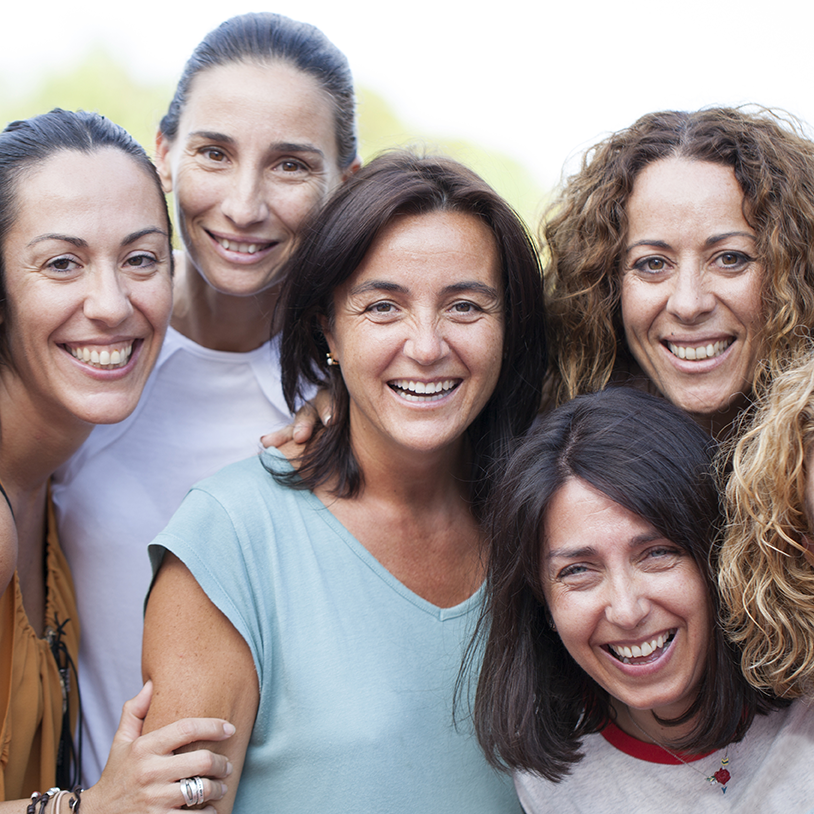
If you or someone you know needs help, call our 24-hour Hotline:

